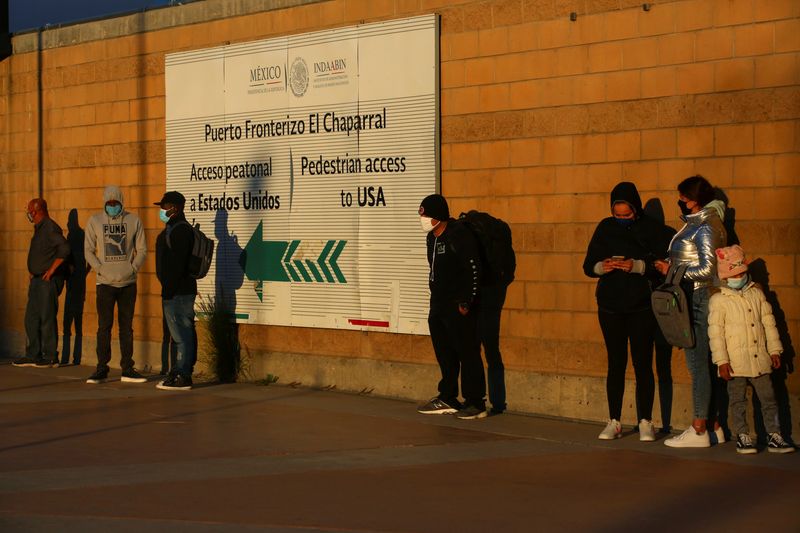WASHINGTON (Reuters) – The Biden administration on Thursday rolled out a sweeping new regulation that aims to speed up asylum processing and deportations at the U.S.-Mexico border, amid a record number of migrants seeking to enter the United States.
The announcement of the new rule came as U.S. officials are debating whether to end a separate COVID-19-era policy that has blocked most asylum claims at the border. The asylum overhaul could provide a faster way to process border crossers if the COVID order is ended.
The final asylum rule, which will go into effect in late May, will authorize asylum officers to accept or reject migrants’ claims for protection soon after they cross the border, in an effort to resolve them in months rather than years by largely bypassing backlogged U.S. immigration courts.
Democratic President Joe Biden’s administration says changes to the asylum system are needed to humanely deal with the rising number of attempted border crossings, which have hit record highs and fueled attacks from Republicans aiming to take control of Congress in the November midterm elections.
Both immigration hawks and pro-immigrant advocacy groups criticized the new policy on Thursday, raising the specter of future legal challenges.
Most migrants caught at the southwestern border come from Mexico and Central America, but an increasing number are arriving from farther places and seeking refuge, including in recent weeks Ukrainians fleeing Russia’s invasion of their country, an action that Moscow calls a “special military operation.”
Under the new rule, which is being issued jointly by the Department of Homeland Security and Department of Justice, more migrants, including families, will be placed in a process known as “expedited removal” to resolve cases more quickly.
It will not apply to unaccompanied children.
The fast-track process will aim to resolve cases within 90 days. While migrants denied asylum will get another chance to make their case before an immigration judge, those cases will also be expedited with a goal of resolving them quickly.
“The current system for handling asylum claims at our borders has long needed repair,” Homeland Security Secretary Alejandro Mayorkas said in a statement.
Immigrant advocate Eleanor Acer, senior director for refugee protection at Human Rights First, said the new rule “risks sacrificing accurate decision-making for its narrative of speed.” At the same time, restrictionist groups say the rule will do nothing to discourage higher levels of illegal immigration.
A U.S. Citizenship and Immigration Services (USCIS) official who briefed reporters on Wednesday under condition of anonymity, said the new system will be phased in gradually and initially be applied only to a small number of migrants.
The Biden administration said in an earlier draft of the measure that it would need to hire about 2,000 additional asylum officers and support personnel, more than double the number working now.
The USCIS official who briefed reporters did not give details about the status of additional hiring or funding.
For now, Biden has kept a controversial order known as Title 42, which was put in place in March 2020 by his Republican predecessor, Donald Trump. It allows U.S. authorities to quickly expel most migrants caught crossing the border to Mexico or other countries to limit the spread of COVID.
The Biden administration is leaning toward ending the order in the wake of recent court decisions that complicate its implementation, but no final decision has been made with a looming deadline next week to renew, modify or terminate it.
(Reporting by Ted Hesson in Washington; additional reporting by Kristina Cooke, Editing by Mica Rosenberg and Jonathan Oatis)





















